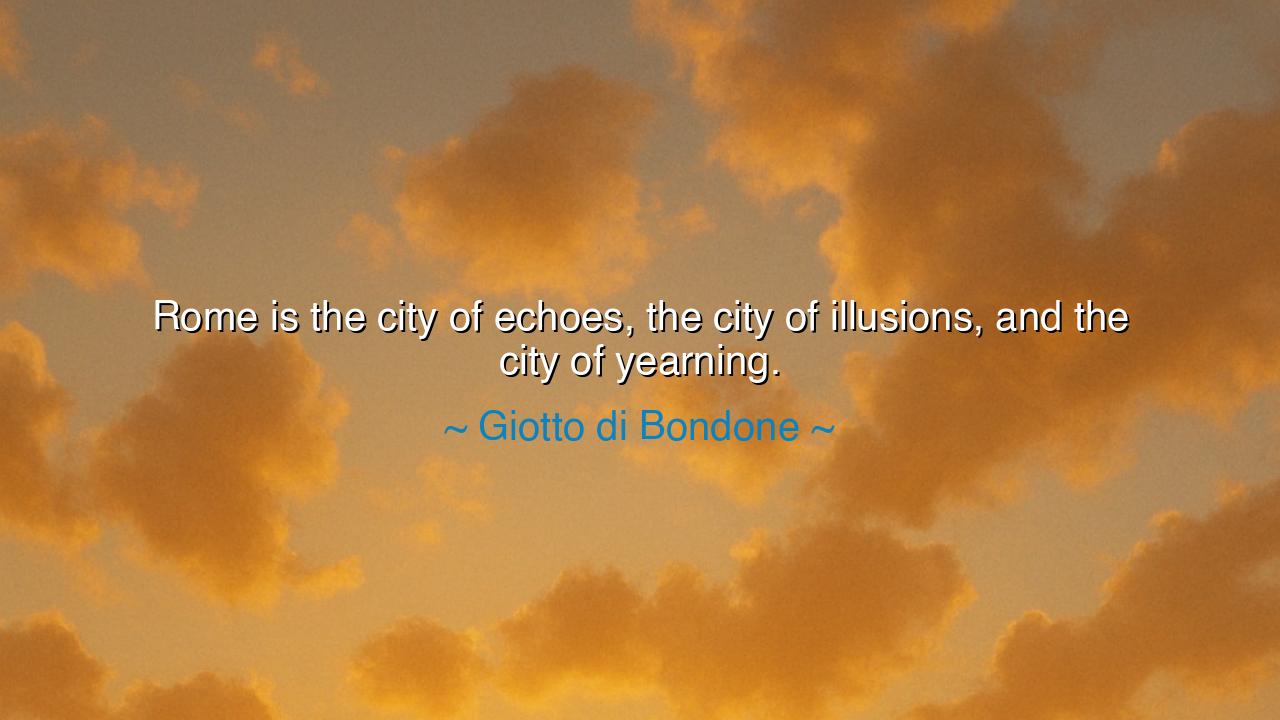
Rome is the city of echoes, the city of illusions, and the city






The painter and visionary Giotto di Bondone, whose brush first breathed human emotion into sacred frescoes, once declared: “Rome is the city of echoes, the city of illusions, and the city of yearning.” These words are not merely a description of stone and streets, but a hymn to the soul of an eternal city, a place where past, present, and dream collide. For Rome is not one city, but many: it is the memory of empires, the mask of grandeur, and the cry of longing that has echoed through centuries.
When Giotto calls Rome the “city of echoes,” he speaks of its layers of memory. Every arch, every ruin, every forum carries the voices of the past—Caesars proclaiming, senators debating, martyrs praying, and poets singing. The echo of their words does not fade but lingers, carried on the stones themselves. To walk through Rome is to walk through time, where the voices of the dead whisper to the living. The ancients would remind us: greatness never dies completely, but reverberates through the ages.
In naming Rome the “city of illusions,” Giotto reveals another truth. For Rome is a place where power once seemed eternal, yet empires fell. Marble palaces crumbled, idols toppled, and banners of conquest withered. Even today, the grandeur of Rome can mislead the eye—ruins that appear permanent are but shadows of what once was. Illusion lies also in the myths Rome told itself: that it was invincible, that it was eternal, that it was the center of the world. Giotto, the painter of divine vision, reminds us that earthly power is but a mask, beautiful yet fragile.
Yet Rome is also the “city of yearning.” For centuries, pilgrims, artists, soldiers, and dreamers have come to it, drawn not only by its beauty but by its promise of meaning. To the Christian pilgrim, it is the seat of faith; to the artist, it is the wellspring of beauty; to the conqueror, it was once the jewel of the earth. Rome embodies longing—for power, for art, for holiness, for immortality itself. Every heart that enters Rome seeks something beyond itself, and in that seeking, reveals its truest desire.
History bears witness to this truth. Consider Michelangelo, who journeyed to Rome not simply to labor, but to touch eternity with his art. In the Sistine Chapel, he poured his yearning onto the ceiling, giving form to the cry of mankind for God, for meaning, for transcendence. Rome provided the stage, but it was his yearning that gave it voice. So too with countless pilgrims who climbed the Scala Sancta on their knees, yearning for forgiveness, or emperors who marched in triumph, yearning for glory. Rome holds these longings as a mirror, showing humanity what it craves most deeply.
The origin of Giotto’s reflection lies in his own time. Living in the Middle Ages, he stood at the threshold between the fading medieval world and the dawn of the Renaissance. Rome to him was not merely a city of ruins, but a symbol of continuity and transformation—where echoes of antiquity met the illusions of earthly glory and the eternal yearning for divine beauty. His brush, which gave humanity back to the painted Christ, reflected the same truth he saw in Rome: that all art, like all life, is both echo and longing.
The lesson for us is profound. Rome is not only a place but a mirror of the human soul. We too are beings of echoes, carrying the voices of our past deeds. We too live amidst illusions, often mistaking the temporary for the eternal. And we too are creatures of yearning, ever searching for meaning, beauty, and truth. To remember this is to live wisely: honor the past without being enslaved to it, see through illusions without despair, and let your yearning guide you toward what is eternal.
Practical action follows. Listen to the echoes within your own life—your memories, your heritage, your deeds. Strip away illusions that blind you—false glories, empty idols, fleeting vanities. And do not fear your yearning, but let it drive you to create, to love, to seek truth. In doing so, you will make your life a Rome of its own: layered with echoes, shadowed by illusions, yet bright with the fire of longing for what is greater than yourself.
Thus the words of Giotto endure: “Rome is the city of echoes, the city of illusions, and the city of yearning.” They remind us that the eternal is not found in stone alone, but in the heart of every soul that dares to remember, to see clearly, and to yearn greatly.






AAdministratorAdministrator
Welcome, honored guests. Please leave a comment, we will respond soon